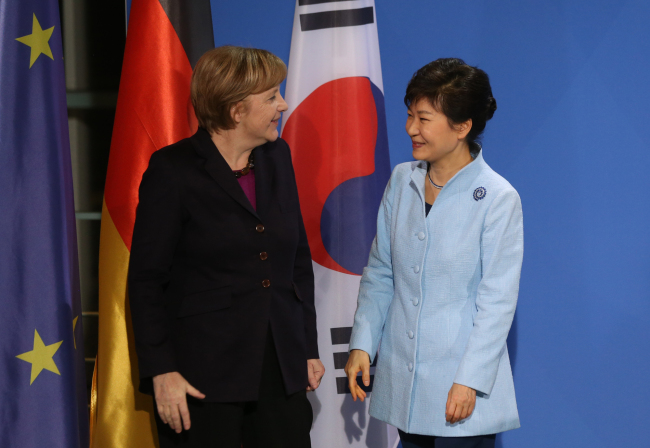Park, Merkel vow to work closely for Korean unification process
By 신용배Published : March 27, 2014 - 08:04
President Park Geun-hye and German Chancellor Angela Merkel agreed to cooperate in South Korea's effort to achieve the unification with North Korea.
The two leaders met during a summit held on Wednesday in Berlin.
How to share Germany's experience of ending decades of national division and promoting unity in a unified nation were among the main topics for talks between Park and Merkel, along with North Korea's nuclear program and economic cooperation between the two countries.
The two leaders met during a summit held on Wednesday in Berlin.
How to share Germany's experience of ending decades of national division and promoting unity in a unified nation were among the main topics for talks between Park and Merkel, along with North Korea's nuclear program and economic cooperation between the two countries.

"For us, Germany is a model for peaceful unification on the Korean Peninsula because the country has gone beyond unification and achieved national unity," Park said during a joint news conference with Merkel. "We agreed to share Germany's experiences in an effective manner."
Park laid out a series of measures the two sides agreed on for experience sharing, including building cooperative networks between financial authorities and economic think tanks in order to study how to raise the funds necessary for unification.
Merkel also said Germany will provide full support for Korean unification.
"Discussions on unification are under way between the foreign ministries of South Korea and Germany, and we will provide support so that unification will be realized in Korea," she said. "Germany was divided for 40 years and Korea has been divided for almost 70 years. I think it is our obligation to help South Korea achieve unification."
Park is currently in Germany for a four-day state visit. The second leg of her European tour is heavily focused on learning about Germany’s unification experience. Park has been stressing the importance of unification recently, calling it a possible “bonanza” that could bring tremendous business opportunities not only for the two Koreas but also for neighboring countries. Park has also ordered officials to create a presidential committee to prepare for unification.
“President Park’s visit to Germany is aimed at sharing the European country’s experience of achieving unification and integration to prepare for the unification of North and South Korea,” said Ju Cheol-ki, senior presidential secretary for foreign affairs and national security.
The two leaders also talked about bolstering bilateral cooperation on trade, investment, industrial and cultural sectors Park was to address the Korean government’s efforts to encourage start-up businesses, and for small- and medium-sized enterprises to have more creativity when developing products. Before meeting Merkel, Park held separate talks with German President Joachim Gauck.
The meeting of the two leaders drew keen attention as they share similar backgrounds and political career paths. Both started their political careers in 1998 and have also become the first female leaders of their countries. The two will also end their terms in 2017. Park is two years older than Merkel.
Park and Merkel have also built a close relationship over last 14 years. The two first met in 2000 when Park, the then vice-chairwoman of the opposition party, visited Germany. Merkel was also an opposition party leader at that time. The two exchanged letters when Park became the chairwoman of the then-Grand National Party in 2004 and Merkel became the first female chancellor a year later.
Merkel was the first foreign leader to make congratulatory calls to Park when she won the presidential election in 2012. Park and Merkel have so far met four times. The two met last met in September on the sidelines of a G-20 summit held in St. Petersburg, Russia. The summit in Berlin on Wednesday was their fifth official meeting.
The highlight of Park’s state visit to Germany is expected to be her announcement of a new vision for the unification of the two Koreas while delivering a speech in Dresden, the former East German economic center, on Friday. She is to receive an honorary doctorate from Dresden University of Technology. She is the first South Korean president to visit the former East Germany, officials said.
Historically, Germany has been a country where South Korean leaders have announced new proposals or policies on North Korea.
In 2000, former President Kim Dae-jung delivered the “Berlin Declaration,” calling for an end to the Cold War on the Korean Peninsula. The declaration led to a historic summit between Kim and then-North Korean leader Kim Jong-il three month later.
By Cho Chung-un and news reports
(christory@heraldcorp.com)








![[Graphic News] More Koreans say they plan long-distance trips this year](http://res.heraldm.com/phpwas/restmb_idxmake.php?idx=644&simg=/content/image/2024/04/17/20240417050828_0.gif&u=)
![[KH Explains] Hyundai's full hybrid edge to pay off amid slow transition to pure EVs](http://res.heraldm.com/phpwas/restmb_idxmake.php?idx=644&simg=/content/image/2024/04/18/20240418050645_0.jpg&u=20240419100350)





![[From the Scene] Monks, Buddhists hail return of remains of Buddhas](http://res.heraldm.com/phpwas/restmb_idxmake.php?idx=652&simg=/content/image/2024/04/19/20240419050617_0.jpg&u=20240419175937)

![[KH Explains] Hyundai's full hybrid edge to pay off amid slow transition to pure EVs](http://res.heraldm.com/phpwas/restmb_idxmake.php?idx=652&simg=/content/image/2024/04/18/20240418050645_0.jpg&u=20240419100350)

![[Today’s K-pop] Illit drops debut single remix](http://res.heraldm.com/phpwas/restmb_idxmake.php?idx=642&simg=/content/image/2024/04/19/20240419050612_0.jpg&u=)